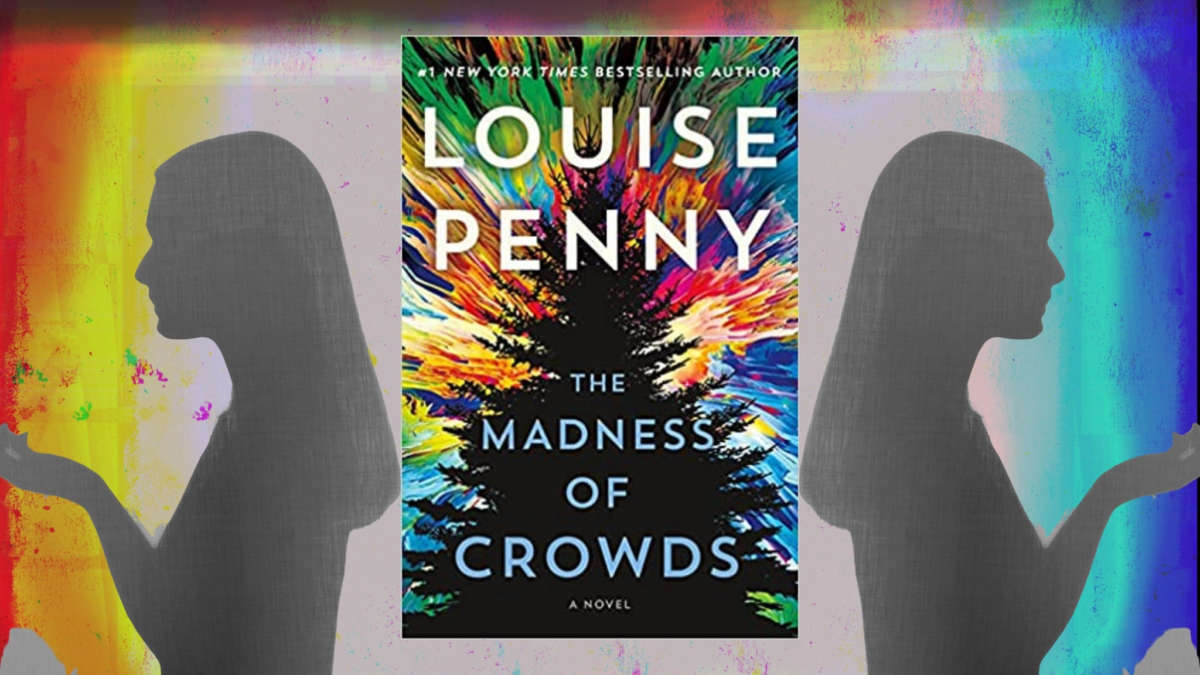Is it too soon to read a novel inspired by the pandemic experience? In Louise Penny’s latest novel, The Madness of Crowds (Minotaur Books), Armand Gamache, Chief Inspector of Homicide for the Sûreté du Québec, and the residents of his cozy village of Three Pines, view the pandemic as a horrible, haunting memory. Happily, the vaccine has arrived. Family and friends have joined to celebrate Christmas and everyone is now safe. Or are they?
As readers expect, another is storm brewing. Controversial statistician Abigail Robinson is coming to lecture at a nearby university, and Gamache has been assigned to supervise the gathering. The event should be a non-starter, but Professor Robinson is preaching the unthinkable in the pandemic’s wake, something akin to mass murder. In a land gripped by post-pandemic fear and frustration, one faction of the masses is enthusiastically embracing Robinson’s agenda. It is even gaining traction with national politicians. Others adamantly oppose Robinson’s idea, which polarizes the crowd, setting up a potential disaster at the event.
PLEADING FOR THE LIVES OF OTHERS
Gamache pleads with the university to cancel the lecture, but they refuse to censor Professor Robinson, and during the rally, a gunman makes an attempt on her life. While Gamache despises the professor’s message, it is his duty to save her life, and so he does. However, Robinson’s subsequent attendance at a local New Year’s Eve party leads to the murder of her assistant, Debbie Schneider. Was Debbie the actual target, or was it a case of mistaken identity? Was someone attempting to stop Robinson from spreading her poison?
Haniya Daoud, “The Hero of Sudan,” and a potential Nobel Prize winner for her humanitarianism, is also visiting Three Pines. During her brief life, she has suffered capture and torture, and has been forced to do whatever was necessary to remain alive. Even murder. Daoud has transformed her hatred for her torturers into a mission to save other at-risk women and children around the world. She, too, despises Robinson’s theories, but is that enough for her to kill Robinson?
Since half of Three Pines attended the New Years Eve fête, the murder suspects run the gamut from the crazy ancient poet, Ruth; to Gamache’s godfather, Stephen; a retired surgeon, Vincent Gilbert; and the Chancellor of the University, Collette Roberge. Gamache and his team discover that each shares an intimate connection to Robinson, implicating them in the murder.
A NOVEL APPROACH FOR AN EXPERIENCED NOVELIST
The previous installments of Penny’s Three Pines series have featured the murder at the beginning of the story, framing the murder as the inciting incident of the broader crime. Here, Penny tries something novel. The pandemic is the inciting incident for everything that occurs on the page. Debbie Schneider’s murder doesn’t occur until the second act of the book, and Penny spends the first act contrasting the ideologies of the charming, persuasive Professor Abigail Robinson to the abrasive, bitchy Haniya Daoud.
Both women desire to save humanity, but whose path is better? Is it Robinson’s proposal of mass murder to prevent another catastrophic pandemic or Daoud’s ruthless methods to preserve freedom and liberty? Penny manipulates the readers’ emotions, making Robinson appear the more compassionate of the duo, although Robinson’s unapologetic assertions ultimately paint her as the monster. Or is she?
The plot thickens as the reader discovers that Debbie’s murder is only the tip of the iceberg. Slowly, Penny reveals that the present is built upon the fragile fabric of past lies, secrets and crimes. Through the various characters, Penny cleverly weaves acts of murder on a global, national and individual scale into Gamache’s investigation of Debbie’s murder.
MORAL DILEMMAS
Since Gamache and his son-in-law and second-in-command, Jean-Guy Beauvoir, are sworn to protect the innocent and the infirm, this case presents moral dilemmas for them. They question whether Gamache should have let Robinson die at the rally or whether she may express her opinions freely. And do they bear the responsibility for preventing her extraordinary delusions from becoming popular?
Penny, who lives close to the U.S.-Canada border, wrote this novel while in quarantine. Halfway through the first draft, she decided she couldn’t ignore the pandemic in the writing of the narrative. She wanted to believe that we’d emerge from the experience, and we’d be able to “embrace, and kiss, hold hands and have meals together.” She says she wrote The Madness of Crowds in that spirit. Penny’s optimism about the future shines brightly through Gamache’s family and Three Pines, and hopefully will shine into your heart as well.
RELATED POSTS
Set in a Post-COVID-19 Chicago, “Seismic Sedition” Is an Absurdly Hilarious Sci-Fi Satire
Literary Ladies: Hillary Clinton, Louise Penny, Stacey Abrams and Isabel Allende
A Parisian Vacation Leads Armand Gamache to Danger in “All the Devils Are Here”
Give the Gift of Reading: Books for Every Reader on Your List





